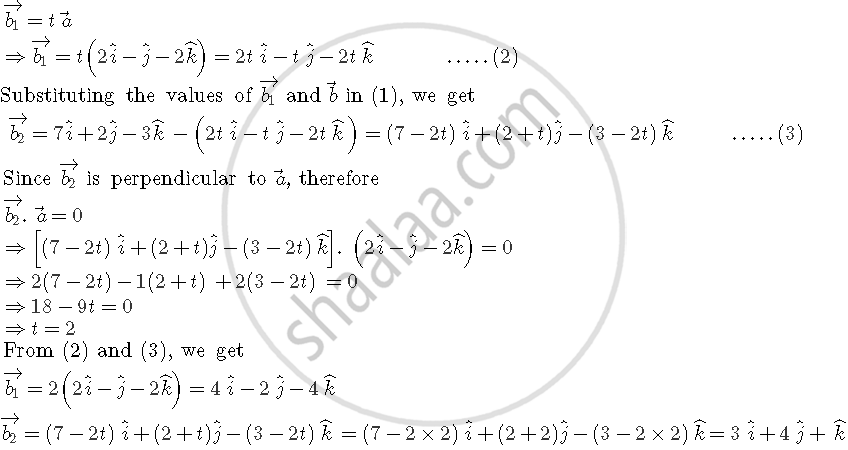Advertisements
Advertisements
प्रश्न
if `veca = 2hati - hatj - 2hatk " and " vecb = 7hati + 2hatj - 3hatk`, , then express `vecb` in the form of `vecb = vec(b_1) + vec(b_2)`, where `vec(b_1)` is parallel to `veca` and `vec(b_2)` is perpendicular to `veca`
उत्तर
Let `veca = 2hati - hatj - 2hatk " and " vecb = 7hati + 2hatj - 3hatk`
Now, `vec(b_1)` and `vec(b_2)` are two vectors such that
`vecb = vec(b_1) + vec(b_2)`
`=> vec(b_2) = vecb - vec(b_1)` ....(1)
Since `vec(b_1)`is parallel to `veca`, therefore

APPEARS IN
संबंधित प्रश्न
If a vector makes angles α, β, γ with OX, OY and OZ respectively, then write the value of sin2 α + sin2 β + sin2 γ.
Write a unit vector in the direction of \[\overrightarrow{PQ}\], where P and Q are the points (1, 3, 0) and (4, 5, 6) respectively.
If \[\left| \overrightarrow{a} \right| = 4\] and \[- 3 \leq \lambda \leq 2\], then write the range of \[\left| \lambda \vec{a} \right|\].
The position vectors of the points A, B, C are \[2 \hat{i} + \hat{j} - \hat{k} , 3 \hat{i} - 2 \hat{j} + \hat{k}\text{ and }\hat{i} + 4 \hat{j} - 3 \hat{k}\] respectively.
These points
Find the vector equation of the plane through the line of intersection of the planes x + y + z = 1 and 2x + 3y + 4z = 5 which is perpendicular to the plane x – y + z = 0. Hence find whether the plane thus obtained contains the line \[\frac{x + 2}{5} = \frac{y - 3}{4} = \frac{z}{5}\] or not.
If `veca` and `vecb` are non- collinear vectors, find the value of x such that the vectors `barα = (x - 2)veca + vecb` and `barβ = (3+2x)bara - 2barb` are collinear.
In the triangle PQR, `bar"PQ" = bar"2a", bar"QR" = bar"2b"`. The midpoint of PR is M. Find the following vectors in terms of `bar"a"` and `bar"b"`:
(i) `bar"PR"` (ii) `bar"PM"` (iii) `bar"QM"`.
OABCDE is a regular hexagon. The points A and B have position vectors `bar"a"` and `bar"b"` respectively referred to the origin O. Find, in terms of `bar"a"` and `bar"b"` the position vectors of C, D and E.
Find the coordinates of the point which is located three units behind the YZ-plane, four units to the right of XZ-plane, and five units above the XY-plane.
Select the correct option from the given alternatives:
Let a, b, c be distinct non-negative numbers. If the vectors `"a"hat"i" + "a"hat"j" + "c"hat"k" , hat"i" + hat"k" "and" "c"hat"i" + "c"hat"j" + "b"hat"k"` lie in a plane, then c is
Select the correct option from the given alternatives:
If `bar"a", bar"b", bar"c"` are non-coplanar unit vectors such that `bar"a"xx (bar"b"xxbar"c") = (bar"b"+bar"c")/sqrt2`, then the angle between `bar"a" "and" bar"b"` is
If `bar"OA" = bar"a" and bar"OB" = bar"b",` then show that the vector along the angle bisector of ∠AOB is given by `bar"d" = lambda(bar"a"/|bar"a"| + bar"b"/|bar"b"|).`
State whether the expression is meaningful. If not, explain why? If so, state whether it is a vector or a scalar:
`(bar"a".bar"b").bar"c"`
For any vectors `bar"a", bar"b", bar"c"` show that `(bar"a" + bar"b" + bar"c") xx bar"c" + (bar"a" + bar"b" + bar"c") xx bar"b" + (bar"b" - bar"c") xx bar"a" = 2bar"a" xx bar"c"`
If `bar"a", bar"b", bar"c"` are three non-coplanar vectors show that `(bar"a".(bar"b" xx bar"c"))/((bar"c" xx bar"a").bar"b") + (bar"b".(bar"a" xx bar"c"))/((bar"c" xx bar"a").bar"b") = 0`
The points A(- a, -b), B (0, 0), C(a, b) and D(a2 , ab) are ______.
Find a vector `vec"r"` of magnitude `3sqrt(2)` units which makes an angle of `pi/4` and `pi/2` with y and z-axes, respectively.
The area of the parallelogram whose adjacent sides are `hat"i" + hat"k"` and `2hat"i" + hat"j" + hat"k"` is ______.
Find the unit vector in the direction of the sum of the vectors `vec"a" = 2hat"i" - hat"j" + hat"k"` and `vec"b" = 2hat"j" + hat"k"`.
The values of k for which `|"k"vec"a"| < |vec"a"|` and `"k"vec"a" + 1/2 vec"a"` is parallel to `vec"a"` holds true are ______.
`bara, barb` and `barc` are three vectors such that `veca + vecb + vecc` 20, `|bara| = 1, |barb| = 2` and `|barc| = 3`. Then `bara. barb + barb.barc + bar(c.a)` is equal to
Find `|veca xx vecb|`, if `veca = hati - 7hatj + 7hatk` and `vecb = 3hati - 2hatj + 2hatk`
If `veca = hati - hatj + 7hatk` and `vecb = 5hati - hatj + λhatk`, then find the value of λ so that the vectors `veca + vecb` and `veca - vecb` are orthogonal.
In the triangle PQR, `bar(PQ)` = `2bara` and `bar(QR)` = `2barb`. The mid-point of PR is M. Find following vectors in terms of `bara` and `barb`.
(i) `bar(PR)` (ii) `bar(PM)` (iii) `bar(QM)`
In the triangle PQR, `bar(PQ)` = 2`bara` and `bar(QR)` = 2`barb`. The mid-point of PR is M. Find following vectors in terms of `bara` and `barb`.
- `bar(PR)`
- `bar(PM)`
- `bar(QM)`
In the triangle PQR, `bar"PQ" = 2 bar" a" and bar"QR" = 2 bar"b"`. The midpoint of PR is M. Find the following vectors in terms of `bar"a"` and `bar"b"`:
(i) `bar"PR"` (ii) `bar"PM"` (iii) `bar"QM"`
Check whether the vectors `2hati + 2hatj + 3hatk, -3hati + 3hatj + 2hatk and 3hati + 4hatk` form a triangle or not.
Check whether the vectors `2hati + 2hatj + 3hatk, -3hati + 3hatj + 2hatk and 3hati + 4hatk` form a triangle or not.
